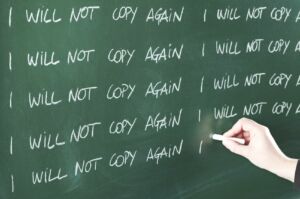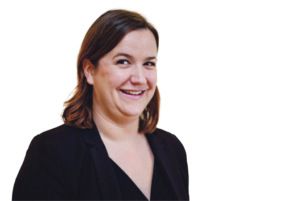Opinion
You’re Still Here: The pitfalls of plagiarism
Kelly Draper
This article is more than 9 years old.

Plagiarism can in most cases be linked back to getting too many lines at school
Every year, I teach my home room students about academic honesty and plagiarism. It is too tempting to select a paragraph or two of text and just poke it in an essay or a report. They rationalise it too: “The website just said it better than I could!” I always hear that as: “I never thought I would get caught!”
Flattered and annoyed
We go over rights and responsibilities. We discuss proper citation protocols. Many of them are active in communities that remix the creative work of others outside of school. Refraining from infringing copyright is something they need to care about at school and in their personal lives. They all have stories to tell: the time someone stole their work, or the time they were lazy and passed something off as their own.
I tell them of the time I saw a quote from my blog in a newspaper attributed to another person. He had copy-pasted an entire post of mine onto his social media page, but left out the paragraphs with details about me. I was half flattered, half annoyed. Eventually I decided that I was glad I inspired someone else. Still, he should have cited me.
And then one student asked me a question that stopped me in my flow: “What are the consequences of plagiarism?”
The plagiarising politician
There are plenty of examples of people in the public eye who have been accused of plagiarism to illustrate my answer. It’s not just 13-year-olds who want to get back to their Playstation who see the allure of Control C/Control V.
For example, the environment minister, Eva Kjer Hansen, lifted passages from a farming lobby group into her presentation for the working group tasked with maintaining rivers and streams.
Interestingly, her rationalisations are very similar to those of my students. She was “inspired” by how the lobbyists put things and just could not phrase it better herself.
The thing is: if my middle school students can make the effort to think for themselves in their assignments, one would hope a professional adult would be able to do the same.
Is an apology enough?
What is alarming is that she does not see the problem of being “inspired” by another organisation enough to use their exact words. Whatever the rights and wrongs of the plan to deal with Danish waterways, it is her only job to weigh up all the possibilities and synthesise them into the best possible choice. Lifting verbatim any pressure group’s words is not a good signal to other interested parties. Now the passages have been properly cited and the minister hopes that the case is closed.
What are the consequences of plagiarism? I told my class that if you were in a job that requires confidence in you, then plagiarism can destroy your career. Of course what happens next depends on what other politicians think was more serious: the dishonesty, or the preferential treatment for one group of lobbyists and if her attempt to make amends went far enough.

About
Kelly Draper
Kelly is a British teacher who came to Denmark for work. She acts informally as a critical friend to Denmark. This has not gone down particularly well with Danes, who often tell her she should like it or leave it. Her blog is at adventuresandjapes.wordpress.com.










































